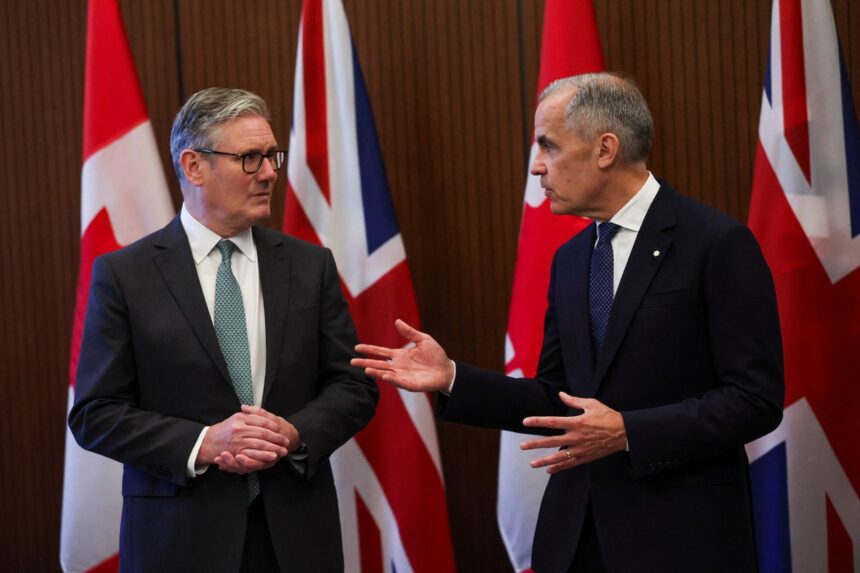Canada’s approval of the UK’s entry into the trans-Pacific trade bloc marks a significant moment for British trade policy after years of post-Brexit uncertainty. While Prime Minister Keir Starmer describes this as a “huge step forward,” the economic impact tells a more nuanced story about Britain’s search for new global trading relationships.
The ratification makes Canada the ninth member of the Comprehensive and Progressive Agreement for Trans-Pacific Partnership (CPTPP) to approve Britain’s membership, leaving only Malaysia’s endorsement needed to finalize the process. Starmer’s government has embraced the deal, which was initially negotiated under Conservative leadership, as a rare point of cross-party consensus in British trade policy.
“This is an important milestone in our accession to one of the world’s most dynamic trading blocs,” Starmer said during his current visit to Canada. The trade deal encompasses a market of 500 million people across 12 Pacific Rim countries, including economic powerhouses like Japan, Australia, and now Britain.
But what does this actually mean for British businesses and consumers? The UK government forecasts a modest 0.08% boost to the economy over the long term – equivalent to roughly £1.8 billion annually. This represents a fraction of what Britain previously gained from EU membership, according to most economic analyses.
Mark Carney, former Bank of England governor and now a senior advisor to Starmer, has been instrumental in helping Britain navigate this new economic landscape. His dual Canadian-British citizenship and connections in North American financial circles have proven valuable as the UK works to strengthen economic ties beyond Europe.
The CPTPP agreement reduces tariffs on goods, removes barriers to services, and establishes common rules for digital trade – areas where Britain aims to capitalize on its strengths in financial services and technology. For Canadian consumers and businesses, the formalization of UK membership will maintain preferential access to British markets that might otherwise have been disrupted following Brexit.
Industry leaders in sectors ranging from automotive to pharmaceuticals have expressed cautious optimism. James Harper, director at UK-based Meridian Manufacturing, tells me: “This agreement gives us certainty for our supply chains that extend into Asia-Pacific markets. After years of trade turbulence, we finally have a stable framework to plan around.”
The deal also carries symbolic weight beyond its immediate economic impact. It represents Britain’s pivot toward the Indo-Pacific region – a strategic reorientation that began under former Prime Minister Boris Johnson’s “Global Britain” agenda and has continued, albeit with less rhetorical flourish, under Starmer’s leadership.
Trade experts note that while the CPTPP is important, it doesn’t compensate for the trade friction created by Britain’s departure from the European Union. According to the Office for Budget Responsibility, Brexit is expected to reduce UK productivity by 4% over the long term – a figure that dwarfs the projected CPTPP benefits.
“The real value of CPTPP membership may be strategic rather than purely economic,” explains Dr. Meredith Crowley, international trade economist at Cambridge University. “It positions Britain within a growing trading bloc at a time when global trade is increasingly organized around regional partnerships.”
The timing of Canada’s ratification coincides with Starmer’s broader diplomatic push to reset international relationships following years of turbulence. His government has signaled a more pragmatic approach to trade, focusing on deliverable benefits rather than sweeping rhetoric about global opportunities.
For Canadian exporters, particularly in agriculture and manufacturing, the formalized agreement provides welcome certainty. “We’ve been in a holding pattern with some UK contracts pending this final approval,” says Marie Lapointe, export director at a Quebec-based food processing company. “Now we can move forward knowing the rules won’t suddenly change.”
The road to CPTPP membership has been lengthy for Britain, with formal accession negotiations beginning in June 2021. The process required Britain to demonstrate its commitment to the bloc’s standards on labor rights, environmental protections, and digital trade – areas where the UK’s existing regulatory framework largely aligned with CPTPP requirements.
While trade ministers celebrate this milestone, the real work begins in helping businesses, particularly smaller enterprises, navigate and benefit from the agreement. Government export support programs will be crucial in translating paper promises into actual trade growth.
As global economic headwinds intensify, with inflation concerns and geopolitical tensions affecting international commerce, the CPTPP provides a structured framework for Britain to diversify its trade relationships. Yet the modest projected economic gains underscore a challenging reality: replacing the deep integration Britain once had with European markets requires multiple agreements across diverse regions.
For ordinary consumers, the immediate effects will be subtle – perhaps marginally lower prices on certain imported goods or new product availability. The longer-term impact depends on how effectively businesses capitalize on the opportunities created by reduced trade barriers.
With Malaysia’s ratification as the final piece of the puzzle, Britain stands on the cusp of securing its most significant post-Brexit trade achievement. The question remains whether this represents the beginning of a successful global trade strategy or merely a modest consolation prize after the economic disruption of leaving the EU.






